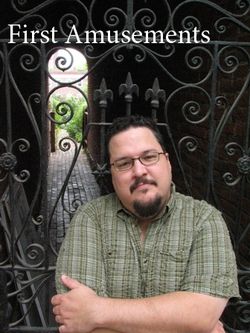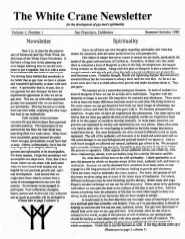Funny and sweet in a way.
Category Archives: Dan Vera
Dan Choi at the Rally Today in DC
Congratulations Pete & Dan
Why We Need Health Care Reform
This is a brilliant video that breaks it down — the needs for government-run health care. Something Ted Kennedy was devoted to passing for the last three decades of his life.
Please share this video with others. It deserves to go viral.
https://youtube.com/watch?v=Jng4TnKqy6A%26hl%3Den%26fs%3D1%26color1%3D0x402061%26color2%3D0x9461ca
WC80 – Editor’s Note
It’s hard not to take a defensive crouch when writing an introductory essay to a special issue on poetry and music. Truth be told, the defensiveness has more to do with the poetry than the music. Music everyone loves and understands. Poetry? That is a more contentious idea. Or seems to be.
I feel compelled to make the case for poetry, to argue for the importance of poetry and the desire for others to read more poetry. Arguments of this kind usually include a mention of the endangered nature of poetry, how no one reads it anymore and how it’s tied to the decay in society. I somewhat agree with all these things, but those kinds of essays always take on the feel of a commercial for high-fiber cereal “You should eat it because its good for you damnit!”
The truth is I’ve always found these kinds of arguments a bit boring and beside the point. Poetry is in our lives and has been there since the beginning. Think of it. For most of us our first real exposure to poetry occurs in childhood with rhymes and little stories.
Jack be nimble, jack be quick…
Jack Sprat could eat no fat… (Jack was a busy boy.)
Eeny, meeny, miny, moe…
They’re the indelible songs we first learned
Mary had a little lamb…
Twinkle twinkle little star…
These poems are the first stories that stuck because they embedded themselves in the brain. But somewhere down the line — and it almost always happened (or happens) in a classroom — the pleasurable experience of enjoying this art form of wordplay is replaced with a mechanical exercise in pulling the little wonder apart, in dissecting the corpse of what was so alive in the ear. For most people I’ve spoken with, these approaches had the result of causing them to run for the exits.
For the last 7 years I’ve run a small reading series in my neighborhood. Most of our work in building an audience has been rehabilitating poetry in the ears and minds of the people who come forth; healing the bad memory of poetry as an aloof inaccessible thing or a laborious exercise for the listener. Our readings are a bit different as we choose a theme and then collect poems from the contemporary and legacy poets we know. So if you came to our reading on “dog poetry” (every June) you would hear 45 of the best poems on dogs written in the English language (some translated into English). So it’s more like an anthology. I mention this not as a plug for a local series but to share that we rarely have the opportunity to hear, much less read good poetry. With the exception of The New Yorker, it is rare to find a poem in a magazine today. Much rarer Gay poetry. I can’t tell you the last time that The Advocate published a poem in its pages.
This was not always this way. Not long ago it was unheard of to publish a magazine without having a poetry editor and publishing a few poems in magazines. [White Crane has long had a poetry editor. Bo Young, the publisher in these parts, began his connection to the magazine as it’s poetry editor. I served as poetry editor for RFD before coming to White Crane.] Theories abound as to the why and when this changed but that’s not really the point here. The point is that there is great poetry being written today but fewer places to read it and fewer places to enjoy the best.
We care about poetry here. For no other reason than poetry is Gay. Yes, I wrote it. Poetry is so Gay. It’s impossible to know the history of the art form and deny that it bears a huge resonance for Gay people and that Gay people have mastered it in powerful ways. Do I need to make the list? Okay then: Whitman, Dickinson, Lowell, Cavafy, Stein, Bynner, Lorca, Lorde, Bishop, Auden, Jordan, Ginsberg, Hughes. All Gay. The list is too long to write here and I haven’t even touched the contemporary poets.
So no defensiveness then. We publish poetry because Gay people write poetry. Damn good poetry too. Which brings us to the damn good poetry in this issue (see how these things flow?).
We’re delighted in this issue to publish the poetry of James Nawrocki, the first winner of the White Crane/James White Poetry Prize for Gay Men’s Poetry. Nawrocki hails from San Francisco, and we here at White Crane are proud of the fact that his work has previously appeared in these pages. The prize itself was judged this year by the powerfully good poet Mark Doty, who has honored us all by looking through the work of the finalists and selecting Nawrocki’s manuscript for publication. We are also proud to publish some poems by the two other finalists Jeremy Halinen of Seattle and James Najarian of Boston.
In striving to honor the muses of Poetry and Music, we have a fantastic interview with the Pulitzer-prize winning composer David Del Tredici and an essay by Arthur Evans on the creative universe.
So enjoy! And I hope you are amused.
Amused. That’s the word the poet Frank O’Hara used when he came across something that really moved him. Something that “touched his muse.” If he loved something, he found it “amusing.” If he was not impressed or moved, he found it “unamusing.” It’s perhaps one of my favorite phrases and I share it with you.
Be amused. Be very amused.
Dan Vera is the White Crane's managing editor. He is also the author of the recently released book of poetry, The Space Between Our Danger and Delight (Beothuk Books). He lives in Washington DC. For more on Dan visit www.danvera.com
For more White Crane, become a fan on Facebook and join us on Yahoogroups.
Subscribe today and keep the conversation going! Consider giving a gift subscription to
your friends who could use some wisdom! If there's an article listed
above that was not excerpted online, copies of this issue are available
for purchase. Contact us at editors@gaywisdom.org
WC80 Updrafts
Updrafts
Edited by Dan Vera
Help these boys build a nation of their own. Ransack the histories for clues to their past. Plunder the literature for words they can speak. And should you encounter an ancient tribe whose customs, however dimly, cast light on their hearts, tell them that tale, and you shall name the unspeakable names of your kind, and in that naming, in each such telling, they will falter a step to the light. Jamie O'Neill
If people are highly successful in their professions they lose their senses. Sight goes. They have no time to look at pictures. Sound goes. They have no time to listen to music. Speech goes. They have no time for conversation. They lose their sense of proportion — the relations between one thing and another. Humanity goes.
Virginia Woolf
Poetry is just the evidence of life. If your life is burning well, poetry is just the ash. Leonard Cohen
I do not care much about the mysteries of the universe, unless they come to me in words, or in music maybe, or in a set of colours, and then I entertain them merely for their beauty and only briefly.
Colm Tóibín
Writing poetry is the hard manual labor of the imagination. Ishmael Reed
The beauty of words in a democracy is that anyone can offer them up, and they live or die not by the ruler’s dictate, but by their ability to permeate hearts and minds, to ignite passions, and to provoke action. Throughout our history, we have learned that words with enough resonance — whether from a slave, a student, or a songwriter — can change history as dramatically as any decree. Joannie Fischer
A verbal art like poetry is reflective; it stops to think.
Music is immediate; it goes on to become. W.H. Auden
Oh fellow mortal out there in the world! Until you learn how to join together once more, to fuse your sorrowful and lonely hearts in some new communion, you can never make true music. The sound you will produce will continue to be the agonized expression of separate and unshared life. Mabel Dodge Lujan
So long as the human spirit thrives on this planet,
music in some living form will accompany and sustain it
and give it expressive meaning. Aaron Copland
Dan Vera is the White Crane's managing editor. He is also the author of the recently released book of poetry, The Space Between Our Danger and Delight (Beothuk Books). He lives in Washington DC. For more on Dan visit www.danvera.com
Updrafts is a regular feature of White Crane. If you have a little bit of wisdom to share with us, send it to us at dan@gaywisdom.org
For more White Crane, become a fan on Facebook and join us on Yahoogroups.
Subscribe today and keep the conversation going! Consider giving a gift subscription to
your friends who could use some wisdom! If there's an article listed
above that was not excerpted online, copies of this issue are available
for purchase. Contact us at editors@gaywisdom.org
WC80 – Review of Ed Madden’s Signals
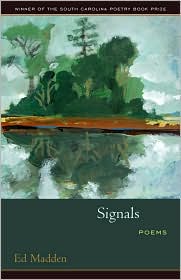 Signals By Ed Madden
Signals By Ed Madden
The University of South Carolina Press
69 pages, $14.95
ISBN: 1570037507
Reviewed by Dan Vera
Ed Madden teaches English and Women’s and Gender Studies at the University of South Carolina. He’s also a hell of a poet. The publication of a book like Signals heralds great things for lovers of honest poetry that captures the lyrical beauty of life. I spent a few hours reading this book, contempling the words and images. I found them populating my mind. I found a deep resonance to the questions I hold in my heart as a Gay man in the world and one deeply in love and partnered.
Along with his academic bona fides Madden serves as writer in residence at the Riverbanks Botanical Gardens in Columbia, South Carolina. One sees evidence of this connection to the natural world in Madden’s work. In poems like “Cabin Near Caesar’s Head” there is a gorgeous attention to the botanical splendor of the countryside. Again and again one is — I don’t know what other word to use but — blessed by a precise litany of names — the luscious names of trees and flowers. There is such great attention here and such care taken in creating miniature pictures in the mind. I have to add that this collection is of importance for those grown thirsty for poems about the love of men, for Madden breaks the drought throughout this book. What’s most refreshing is the exercise doesn’t seem forced or premeditated. Madden is writing plainly but with intention.
Signals has a number of poems that speak to the peculiar nature of the South’s ever-present racial history. Others have done this. But Madden is writing from his perspective as a gay man partnered with another. This happens best in the poem “Confederates,” a poetic account of a day marching against South Carolina’s confederate-laced flag. When a woman asks what the two white Gay men are doing at the march, the question has an immediate percussive ring that lays bare the joint allegiances Gay men and people of color should hold at this point in history. It’s startling and affirming at the same time. I can’t recall another poet writing of these things so effectively and convincingly.
Last October, after many years of being an admirer of his work, I had the good fortune to read with him at the Atlanta Queer Literary Festival. Hearing him read from these poems is a memory I will long treasure.
Signals is the resulting book from Madden’s winning the 2008 South Carolina Poetry Book Prize. It is the greatest gift South Carolina has given me. The gift is yours for the taking.
Dan Vera is White Crane’s managing editor and a poet living in Washington, DC.
For more White Crane, become a fan on Facebook and join us on Yahoogroups.
Subscribe today and keep the conversation going! Consider giving a gift subscription to
your friends who could use some wisdom! If there's an article listed
above that was not excerpted online, copies of this issue are available
for purchase. Contact us at editors@gaywisdom.org
WC80 – Our Caribbean
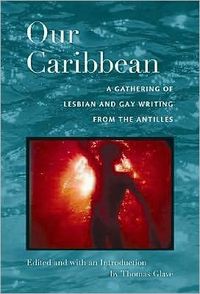 Our Caribbean:
Our Caribbean:
A Gathering of Lesbian and Gay Writing from the Antilles
Edited and with an introduction
by Thomas Glave
Duke University Press $24.95
ISBN-10: 082234226X, 416 pages
Edited by Thomas Glave
Reviewed by Dan Vera
A collection like Our Caribbean: A Gathering of Lesbian and Gay Writing from the Antilles doesn’t come across too often. I can pretty much remember all of them. There’s the two Gay Sunshine anthologies: My Deep Dark Pain Is Love and Now the Volcano. Then there’s Jaime Manrique’s two great anthologies Virgins, Guerrillas and Locas: Gay Latinos Writing About Love, and Besame Mucho. Both of those came out in 1999 as did Erasmo Guerra’s anthology Latin Lovers. Anthologies by Gay people of color are rare. It’s “off the radar screen” at the major (or minor) publishing houses. This is too bad because anthologies like Our Caribbean reminds us that the breadth of Gay and Lesbian experience is more wide and varied, and richer, then we normally realize. I need to point out that an anthology like this is also of tremendous help to Gay and Lesbians of Color. I recall many years ago trying to make my Cuban mother understand what it meant that her child was Gay. She acted as if it were something I’d “caught” here in the United States. It wasn’t until we were both able to enjoy Reinaldo Arenas’ memoir Before Night Falls that she “got it” and was able to recover her own memory of the Gay people she knew in Cuba. In her upbringing—like that of many religious people—there were “no gays” around her. It was an unspoken thing. But Arenas’ book revealed to her a part of her culture she had forgotten and a perspective that deepened her own understanding of identity and exile. I can never give enough thanks to those authors and publishers that allowed that healing and acceptance to begin.
Thomas Glave has collected an impressive collection of writings by some of the leading writers from the Antilles. Arenas’ work is here, as is the work of Virgilio Piñera, Audre Lorde, Andrew Salkey and Assotto Saint. I believe the inclusion of these now ancestral Gay and Lesbian writers gives the collection its deep roots. In the case of Lorde and Saint—two writers who are considered “American” by many of their fans—their presence in this anthology reminds us that they were deeply Caribbean voices. Glave, who wrote the brilliant Lammy-winning Words to Our Now: Imagination and Dissent, has given us a collection that reflects the literary richness of the Caribbean and its diaspora.
It is a rich trove of fiction, memoir, nonfiction and poetry and includes much work translated from the Creole, Dutch and Spanish. Standouts for me included the descriptive ornamental beauties of Aldo Alvarez’ “Property Values,” Glave’s defiant and call to democracy “Whose Caribbean? An Allegory, In Part”, Juanita Ramos’ narrative autobiography, Rane Arroyo’s “Saturday Night In San Juan With the Right Sailors” and “Almost A Revolution For Two In Bed,” the gorgeous patois of Shani Mootoo’s paean to Indian food, “Out On Main Street.”
One warning though. You will fall in love with many of the authors in this book. The iconic ones—Arenas and Lorde for example—their work is widely available. But for the younger ones still living, we can only hope to find more of their work in the future. For the many writers in non-English languages, access to their work is difficult if not impossible to find (Virgilio Piñera and Pedro De Jesús). Others just need more publishers to give them the space and opportunity to be read. Perhaps this book will precipitate that. These thirty seven authors deserve it and our need for their perspective is dire if we are to know our selves more thoroughly.
This is an excerpt. Subscribe today and keep the conversation going! Consider giving a gift subscription to
your friends who could use some wisdom! If there's an article listed
above that was not excerpted online, copies of this issue are available
for purchase. Contact us at editors@gaywisdom.org
For more White Crane, become a fan on Facebook and join us on Yahoogroups.
The 100 Best LGBT Blogs!
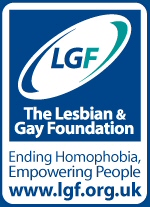 Well, we just received word that we've been chosen as one of the "Best 100 LGBT Blogs" by the UK's Lesbian & Gay Foundation. How great is that?
Well, we just received word that we've been chosen as one of the "Best 100 LGBT Blogs" by the UK's Lesbian & Gay Foundation. How great is that?
The list includes some of the heavy hitters, Andrew Sullivan, Joemygod, and towleroad and we're happy to be included among them.
As the editors wrote:
"LGF online have scoured the internet to bring you the most informative, entertaining and inspiring blogs from around the world…the blogs in this list have a call to arms, they want to inform you about your LGBT rights, and they want you to use them."
In highlighting the Gay Wisdom blog they mentioned our founding principle:
"Committed to the certainty that gay consciousness plays a special and important role in the evolution of life on Earth."
Happy Birthday To Us!
Bob Barzan
the founder of our magazine, published the first issue of the "White Crane Newsletter."
The year was 1989 and Barzan was leading a Gay Men's discussion group in the San Francisco Bay Area. The newsletter was a way to share more information about the historical and cultural roots of Gay people.
The newsletter was distributed to members of the group, who passed it along beyond the group and this blossom that grew into a quarterly that is now the twenty year old magazine known as White Crane.
Barzan chose the name because in the ancient traditions of China and Japan, the white crane is a symbol of happiness and wholeness. Suggesting high-flying aspiration and convention-defying independence, it is an appropriate symbol for the Gay spiritual quest for meaning and wholeness. In that first issue Barzan described White Crane's mission:
"The driving force behind this newsletter is my belief that as gay men we have a unique and wonderful spirituality to share with each other. A spirituality that is, in part, due to our gayness but also because we have all experienced oppression of who we are as gay men…This has forced us to drink from our own wells, exploring new ways that lead to our authenticity."
To see a copy of that first issue of White Crane (in PDF form) download the first issue of White Crane.
